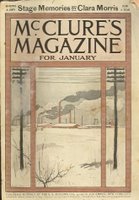 Teddy Roosevelt was president for almost 8 full years between 1901-1909, and he ran for a 3rd term in 1912. That election ended up with Woodrow Wilson winning with the Republican votes divided between Taft and Roosevelt. This win for Wilson seemed to signal an end to TR's career.
Teddy Roosevelt was president for almost 8 full years between 1901-1909, and he ran for a 3rd term in 1912. That election ended up with Woodrow Wilson winning with the Republican votes divided between Taft and Roosevelt. This win for Wilson seemed to signal an end to TR's career. During his presidency, TR felt that muckraking journalists were a danger to democracy b/c they riled up anti-government or anti-American feelings when they exposed government and business corruption. People like himself (educated, informed, those with good intentions) are the ones who should be controlling reform. Reform is better than revolution, TR believed.
These muckrakers were extremely pivotal in bringing about changes in monopolistic businesses (Standard Oil), changes in the meat and medicine industries, and in poverty and local and state government corruption. Yet, TR felt that he was the best of both worlds - reform but not radical reform.
So, my question for you is: who is right, TR or the muckrakers? Should the president lead reform or should it be the journalists? Or, do you think there should be someone else being at the forefront of business and government? Congress? Consumers? Explain your answer (in a minimum of 150 words).